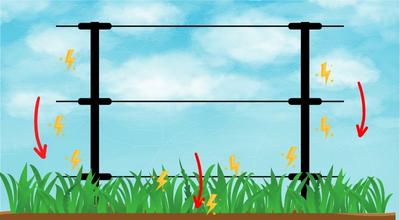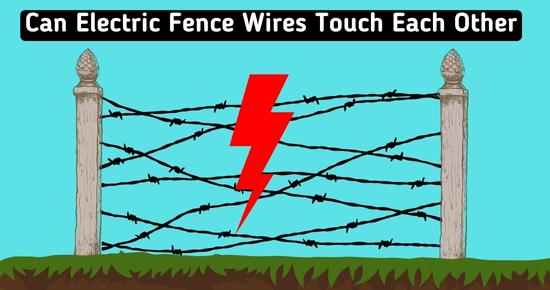Electric fence wires should be kept insulated from each other or other non-circuitry objects. But, have you ever wondered what happens if electric fence wires touch each other? Let’s explore!
Before heading toward the main topic, learn how electric fences work, as it’ll help you to understand what happens if fence wires touch other wires or objects.
How does Electric Fence work?
Let’s dive into the basics first. Electric fences deliver voltage pulses to the fence via the live wires (connected to the live terminal). Ground wires placed parallel to live wires take the current back to the energizer.
So when a human or animal touches a fence wire, the current will pass through its body to the earth(soil).
Ground rods are installed underground to catch this free charge and are connected to the charger’s ground terminal. The current will move back to the energizer, increasing its strength.
Can Electric Fence Wires Touch Each Other?
If your electric fence consists of all live wires, whether installed in series or parallel wiring (grounded through rods rather than by installing ground wires parallel to live wires), then they can indeed touch each other, but this can cause significant harm. In configurations where all wires are live, they are interconnected at various points in the fence circuit. If these wires touch, the current will remain within the live wires. However, random points of contact between the wires may alter the current’s path, affecting its flow and effectiveness along the fence. Although this might not severely impact the fence, ideally, the wires should not touch.
However, if the fence is set up so that the live and ground wires run parallel to each other (a Hot-ground electric fence), then the fence wires must not touch each other. In this setup, if the wires touch, the current will flow from the live wire to the ground wire and back to the energizer, completing the circuit without the need for external contact, resulting in either zero or very mild shock delivery as the circuit is already complete.
To optimize the fence’s effectiveness and ensure it delivers a potent shock, fence wires should be kept away from each other and objects outside the circuit that can drain current from them, such as ground, grass, plants, and any conductive materials.
Can an electric fence touch grass?
Although grass is not a good conductor, still it contains a little water content(in the body) and dew drops outside, which allows it to drain a small amount of current. While in rainy seasons, grass, ornamental grass, and bushes grow tremendously.
Think, if a single piece/blade of grass drains a small amount of current, then excessive grass and vegetation touching fence wires will drain excessive power/charge, resulting in power loss and voltage drop, and your fence will become insecure/weak.

That’s why it’s recommended to reduce vegetation and grass as much as possible with time. Also, install the lowest fence wire at least 1 foot high.
Can an electric fence touch wood?
If your electric fence wire is touching wood/trees or you have tied them for support, as the wood get’s wet, it’ll also drain voltage(pass current). When someone touches that tree/wood, he’ll get a shock.
In such cases, your fence charger will have to output more power/current to counter the voltage and power drop. If this condition continues too long, your fence charge may fail due to excessive current requirements.
An electric fence should act as a capacitor, and must only discharge when a human or animal get’s in contact(touches) with fence wire. So keep your fence from touching any external object, such as grass, wood, metals, or other fence wires.
Do electric fences work in the snow?
In winter, snow layers cover the ground and turn into hard ice. Ice is not a good conductor, and many feet of ice layers make the ground/soil inaccessible.
For example, when an animal such as a dog touches fence wires covered with ice, the current won’t pass through its body to the ground. When the current can’t reach the ground(soil), it’ll not deliver a quality shock to someone touching the fence wires.
The current will not reach back to the energizer, losing its power, and the whole fence circuit will fail. So your electric fence will deliver very low to no power shock.
So it’s advisable to use a hot-ground fence circuit in heavy snow(winter) that doesn’t require grounding/stakes to deliver a shock. If someone(human/animal) touches the ground and live wire together, he’ll get a shock.
Also, you can use a cut-off switch to disconnect wires from the circuit buried under snow. Install your fence charger in a warm place, as low temperature hinders(impacts) current flow.
Can an electric fence touch the ground?
If an electric fence touches the ground(earth/soil), current from the wires will escape to the ground, effecting the fence circuit working. Thus your fence will deliver a weak shock to someone who touches the fence.
An electric fence should carry current from the charger/energizer via live wire and back through the ground wires. When someone touches the fence, current travels to earth through their body.
However, when fence wires touch the ground, the current path will be twisted(entangled) and directly travel to the ground(soil) without being touched by anyone.
So the current will move irregularly, complicating the fence circuit. Current will escape to the ground, and hence your fence loses power(less effective shock).
To make an electric fence hotter, it should not touch any external component such as other fence wires, ground, wood, or metal.
The minimum is the interference(things touching) with your fence; the more power it’ll have to deliver a strong shock.
Can fence wires touch ground stakes?
Ground stakes catch free current/charge from the earth (passes through human/animal body) back to the fence energizer(charger).
If the fence wires are touching ground stakes, the current will be directly transferred from the live wires to the ground rods and then back to the energizer.
The current will change its assigned path, interrupting the whole circuit flow, so the electric fence will become ineffective or completely fails.
How to fix loose fence wires(touching each other)?
Loose strands is the most common reason fence wires touch each other. If you have used fewer fence posts, your fence wires need support to stay in position.
That’s why it’s recommended to use high tensile wire, as it’s more flexible and needs fewer posts for support(50 feet apart). While if you have used other wires such as barbed, poly wire, or tape, use fence post at a maximum of 10 feet intervals.
Use fence posts frequently to keep your fence wires in place and from touching each other, but it’ll obviously increase the cost.
Also, ensure you’ve installed/driven fence posts at the same depth(2-3 feet). It will help you install fence post insulators(clips) at the same height, keeping the fence wires in place and preventing them from touching each other.
How to keep electric fence wire tight?
Use a ratchet wire strainer to tension loose fence wires and prevent them from touching each other(short circuit).
- Inline or no-cut ratchet strainers are specially used for electric fences as they don’t require cutting a wire.
- Pass the wire from the back end of the ratchet and then from the wheel’s front end.
- Put the clip down so the wheel doesn’t move back(use to loose wire).
- The ratchet strainer handle tightens the wire by rotating the ratchet wheel.
Conclusion
So in an ideal electric fence circuit, fence wires shouldn’t contact each other or any other component to prevent power(current) loss and voltage drops.
The path/loop designed for current flow will be shorted if electric fence wires touch each other. Hence the whole fence circuit will be compromised, turning your electric fence into an ineffective security system that could be easily breached.
Besides touching each other, fence wires should not be touching any other entity, such as grass, wood, or ground stakes, as each will drain some charge, resulting in excessive power loss.
Hopefully, this explanation will help you understand why electric fence wires should not touch each other.

